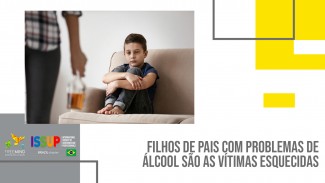Children are the biggest victims of alcohol use

Amid the devastating effects of the COVID-19 pandemic, those who consume too much alcohol have further increased their consumption - putting vulnerable children at even greater risk. Children of parents or guardians with alcohol problems are often forgotten victims of the crisis.
The COVID-19 pandemic has had devastating effects around the world. This has led people to isolation, increasing loneliness and mental health problems. This resulted in some people using alcohol as a health-damaging mechanism during the pandemic.
According to the Institute for Alcohol Studies (IAS), alcohol consumption polarized in 2020 during the pandemic.
Those who consumed less reduced consumption or became without alcohol, while those who consumed too much increased their consumption even more.
The harmful effects of alcohol have been a health crisis for countries for a long time. The pandemic has worsened its effects.
According to data from Public Health England, by 2020, almost 1 in 20 people consumed alcohol heavily with more than 50 doses of alcohol in a week. That's a one-third increase before the first block.
Parents who consume more than 50 doses per week increased from 2.6% before blockade to 4.2% after blockade.
The forgotten victims of the alcohol load are the children of parents with alcohol problems. Due to blocking measures and school closures and other activities for children, many are at home and often have no choice but to stay at home.
A study published in November 2019 found that even non-alcohol-dependent use by parents negatively affects children. It has been reported that the use of alcohol by parents led to children,
- Who receive less attention than usual,
- Being put to bed sooner or later than normal hours,
- Having discussions with parents more than usual, and
- Being on the receiving end of greater unpredictability.
These effects are likely to be amplified during the coronavirus crisis with their measures of blocking and increasing alcohol consumption by parents.

Children of parents or guardians with alcohol use problems face much greater harm, including neglect, violence, and abuse. In Europe, 16% of all cases of child abuse and neglect are alcohol-related. Many vulnerable children would be trapped at home with no escape options due to blocking measures.
Mona Örjes, president of Junis*, in her blog described several actions that can be taken to help vulnerable children.
- When calculating the risk of school closures, also take into account the potential consequences of vulnerable children being put at even greater risk at home.
- Talk openly with all the children in class or in the group, because you don't always know who has difficulties at home. Make sure that all children have a way to connect with a trusted teacher or leader.
- Try to find a way to regularly check students/children.
- If possible, keep some activities open.
- Provide fun online activities where kids can connect with you and/or each other.
*Junis Junis is a Swedish children's organization that provides opportunities for fun and development of leisure activities where the children themselves can get involved and decide.
Source: Movendi